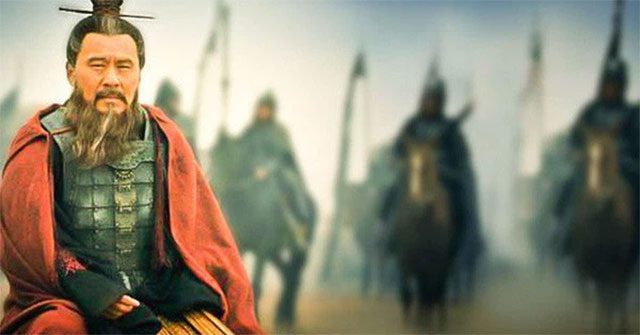In everyday life, we often use the phrase “Mention Cao Cao, and Cao Cao arrives” to describe people or things that come at just the right moment.
This famous saying has become a common expression for many and is indeed related to Cao Cao (155 – 220), an outstanding military and political figure during the late Eastern Han Dynasty and the early Three Kingdoms period in Chinese history.
At the end of the Eastern Han period, after struggles among factions and the Yellow Turban Rebellion, the Han Dynasty was in turmoil. Emperor Ling of Han (156 – 189) passed away, and Emperor Sha of Han (175 – 190) ascended the throne. However, Dong Zhuo then led troops into Luoyang, deposed Emperor Sha, and installed the eight-year-old Liu Xie as Emperor Xian of Han (181 – 234), declaring himself Chancellor, controlling the emperor, and manipulating the court, which caused widespread outrage.

Cao Cao on the big screen.
Once, when Emperor Xian was pursued by the coalition of Li Jue and Guo Si (the two leaders of the conspiracy to usurp the throne), someone suggested recommending Cao Cao, stating that he had recently quelled the Yellow Turban Rebellion in Qingzhou and could save the emperor.
Notably, while this news was still on its way, the coalition of Li Jue and Guo Si had already arrived. Just when it seemed there was no way out, Cao Cao unexpectedly ordered Xiahou Dun to march out to rescue the emperor in time, defeating the forces of Li Jue and Guo Si. Cao Cao achieved great merit and was promoted in rank. Thus, the saying: “Mention Cao Cao, and Cao Cao arrives” was born, indicating that Cao Cao came to the rescue just in time.
Cao Cao then took Emperor Xian back to Xuchang, transforming it into the new capital of the Han Dynasty, and officially used the title “Son of Heaven” to command the feudal lords. This was also a significant step for Cao Cao to develop his power, achieve the status of a hegemon, and establish great accomplishments later on.
The latter part of the famous saying that no one dares to utter
In reality, the phrase “Mention Cao Cao, and Cao Cao arrives” is incomplete. The full version should be: “Mention Cao Cao, and Cao Cao arrives; escaping right before your eyes, is it not worth a laugh?”
The latter part of this saying also originates from an event during the Three Kingdoms period involving Cao Cao and Lü Bu.
In 194, when Lü Bu was stationed at Buyang, Cao Cao led his troops to attack this location. However, during the battle with Lü Bu, Cao Cao fell victim to a scheme by Chen Gong.
Cao Cao’s army suffered a significant defeat, his camp was burned, and he was nearly captured by Lü Bu. Specifically, while fleeing amidst the flames, Cao Cao unexpectedly encountered Lü Bu, who was approaching with a spear and asking, “Where is Cao Cao?” At that moment, Cao Cao calmly pointed and replied, “The one riding the golden horse is up ahead.”
Upon hearing this, Lü Bu ignored Cao Cao and immediately chased after the person in front. This allowed Cao Cao to escape.
In this battle, Cao Cao suffered a great loss and even sustained burns to his left arm. However, the irony lies with Lü Bu, who actually had Cao Cao in his grasp but failed to recognize him, thus missing the opportunity to kill Cao Cao. Hence, the saying “Escaping right before your eyes, is it not worth a laugh?” became popular.
However, when Cao Cao rose to power, no one dared to mention the latter part of this saying. For if Cao Cao heard it, that person would not meet a good end.


















































